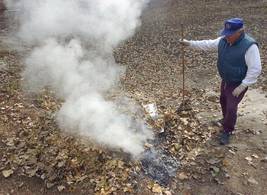weekly column
|
Each week, find a commentary on something connected to verses of Torah or another source of wisdom
|
|
Each week, find a commentary on something connected to verses of Torah or another source of wisdom
|
 The Leviticus:8 Project A handful of the choice flour and oil of the meal offering shall be taken from it, with all the frankincense that is on the meal offering, and this token portion shall be turned into smoke on the altar as a pleasing odor to the LORD. Leviticus 6:8 The sense of smell is often relegated to secondary status among the others. But it has two characteristics that set it apart from sight, hearing, taste and touch. First, smells tend to linger even after the stimulus has been removed. And second, smell can trigger memories with more profundity. That former quality is no surprise. You know that when something acrid or pungent invades your airspace the scent seems to take up residence inside you nose even after the wind blows it away or you leave the site of the source. It is not permanent, fortunately. But it is persistent. The latter is a staple of realtors around the country. Many of them I know bake chocolate chip cookies just before an open house to trigger warm associations with prospective buyers. A friend who was particularly adept at caring for an incapacitated friend said she would often fry some onions around 4:00 in the afternoon so that returning family members would have a sense of something on the stove. And an entire industry has grown up around removing some odors and introducing others as aromas. When my eldest child was in kindergarten, she demonstrated this idea. We were expecting company on a Tuesday night and my wife had cooked a special dinner and baked a dessert – something generally done for Shabbat dinner on Friday. My daughter walked into the kitchen from outside, took a sniff and said, “Hmm. Smells like Shabbat.” There is a scent I no longer smell because, well, it was a short-term and long-term danger. Back in the day, in the fall we would rake the leaves from our yards into the gutter and set them on fire. They wouldn’t flame, but they would smolder indefinitely until turning all to ash and washing away in the next rain. I loved that smell, and if I got a whiff of it again, I immediately would be on my Schwinn in the crisp autumn air cruising along the tree-lined streets between my school and my house. I read once that our sense of smell was the latest to develop such sensitivity. According to the article, personal hygiene of the kind that is now so obsessive was a much more casual affair in the days before plumbing and Palmolive. Noxious odors were masked when they got overbearing, but the day-to-day stink of physical labor was familiar and unnoticeable. That’s not to say that little Rivka didn’t enter the tent on the Tuesday that the tribal chief was visiting and say, “Hmm. Smells like Shabbat.” Some smells were probably always like that. The pleasing odors of the altar were probably pleasing to the people at least as much as they were presumed to be pleasing to God. Some combination of wood and fat and fragrant spices lingered once sniffed and likely spurred a reminder to be conscious of the divine presence that dwelled in the Tabernacle. There were no cookies to bake or onions to fry, but the familiar aromas certainly were reassuring too those who felt physically or spiritually on the outside wanting to come in. The persistence of an unpleasant stench, similarly, still carries with it an automatic repulsiveness. We know to avoid sewers and garbage heaps and the like. (And don’t ask me to take a whiff of curry – not my thing.) We have taken this sensation alone and turned it into a term of judgment. We never say, “You feel, you sound, you taste,” or “you look.” But even when no actual odor is involved, telling someone that they smell, stink, reek, or are redolent delivers an immediate message of disapproval. These days there are whiffs of stenches past emerging from certain kinds of politics. They linger in the nose and remind us of memories we hoped to forget. They stink. But every now and then, even in moments of grief and loss, the scents of better times waft through the air, set loose from an altar in a chapel or church. Pleasing odors. Happy memories. Smells like better times.
0 Comments
Leave a Reply. |
Archives
October 2023
Categories |